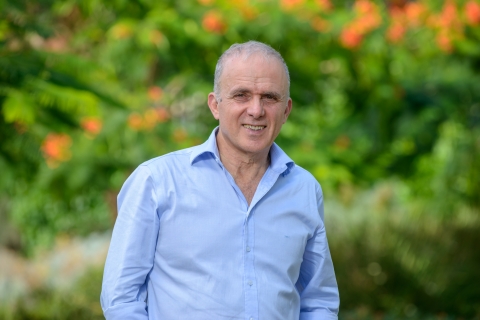Blocking children’s bone cancer
Study by Prof. Yosef Yarden offers new hope for patients
Briefs

New research at the Weizmann Institute of Science has clarified a mechanism that supports the aggressive progression of Ewing sarcoma, a rare type of childhood bone cancer. What’s more, the new study demonstrates how this mechanism can be controlled, an achievement that may eventually result in a new and personalized treatment strategy for human Ewing sarcoma patients.
Ewing sarcoma is the second most common type of bone cancer in children. Most cases respond to a combination of surgery, chemotherapy, and radiation, with successfully treated patients requiring lifelong monitoring for the side effects of harsh anti-cancer treatments. When diagnosed after the cancer has spread beyond the bone, however, the survival for Ewing sarcoma rate plummets to less than 30 percent.
In a paper recently published in Cell Reports, Prof. Yosef Yarden of the Department of Biological Regulation, together with Dr. Swati Srivastava, a postdoctoral fellow in his lab, clarified the molecular dynamic that results in the creation and activation of the Ewing sarcoma oncogene.
The research focused on receptors for steroid hormones called glucocorticoids. These receptors are present in virtually all human cells, conveying hormonal messages related to stress, wakefulness, and a host of other important functions. But sometimes glucocorticoid receptors stimulate malignant growth, a process that begins when these receptors move into the cell nucleus and bind with molecules known as transcription factors that turn genes on or off.
Prof. Yarden and his team discovered that when glucocorticoid receptors bind to transcription factors of the E-twenty six (ETS) family, something that throws the oncogene associated with Ewing sarcoma into overdrive. Physical binding between glucocorticoid receptors and the protein produced by this oncogene increased the growth and migration of Ewing sarcoma cells in a laboratory dish—and gave an even stronger boost to the growth and spread of the sarcoma in laboratory mice.
The medical significance of these findings is that they open the door to a new treatment option for Ewing sarcoma, based on existing drugs that control glucocorticoid receptor activity.
When the researchers implanted human Ewing sarcoma cells into mice, the tumors grew much more slowly when the mice were treated with metyrapone, an FDA-approved drug that reduces the synthesis of glucocorticoids. In separate experiments, mifepristone, another approved drug that blocks the glucocorticoid receptor, prevented the spread of Ewing sarcoma from bone to the lungs in a mouse model. Both studies demonstrated how, by blocking glucocorticoid receptor activity, it is possible to control the growth and spread of Ewing sarcoma.
The researchers also performed a genetic analysis of tumor samples from human Ewing sarcoma patients, revealing seven genes regulated by the glucocorticoid receptors that were expressed in higher-than-normal levels in patients with particularly lethal tumors. This genetic signature could help clinicians identify patients most likely to benefit from drug treatment.
“Our findings provide the basis for a personalized approach to the treatment of Ewing sarcoma,” Srivastava says. The fact that the study made use of drugs that have already been approved for other uses should facilitate the implementation of this approach.
Prof. Yosef Yarden's research is supported by the Dwek Institute for Cancer Therapy Research; the David and Fela Shapell Family Foundation INCPM Fund for Preclinical Studies; the Moross Integrated Cancer Center; the Dr. Miriam and Sheldon G. Adelson Medical Research Foundation; the Willner Family Center for Vascular Biology; the Rising Tide Foundation; the Marvin Tanner Laboratory for Research on Cancer; the Comisaroff Family Trust; and the European Research Council. Prof. Yarden is the incumbent of the Harold and Zelda Goldenberg Professorial Chair in Molecular Cell Biology.

Prof. Yosef Yarden








